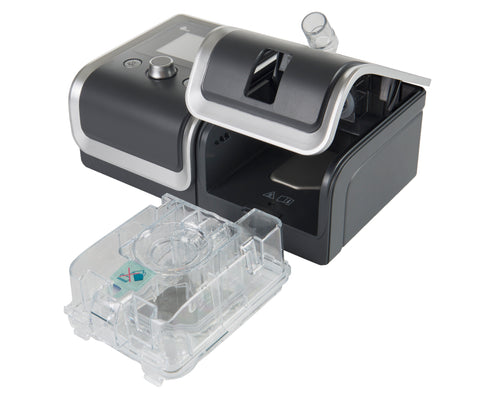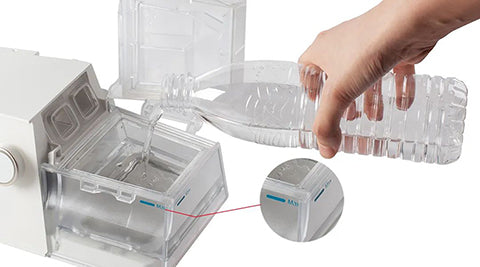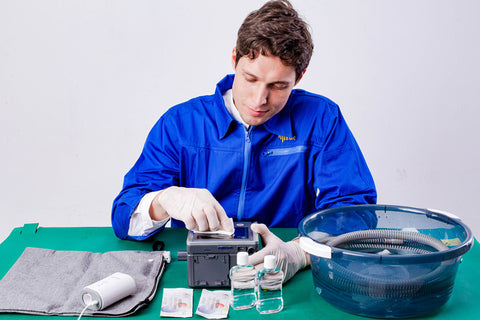1. Why do I need a humidifier for my CPAP?
What does a CPAP machine humidifier do?
Many patients experience mouth dryness and airway dryness when using a CPAP machine without a humidifier, which can lead to a dry nose, nose bleeding, and headaches. The CPAP machine can cause dryness, especially in winter.
When using the CPAP machine, the moisture in the nasal airways will be lost and a humidifier is designed to provide more moisture for comfort. A humidifier can effectively reduce nasal dryness and inflammation, making patients satisfied and comfortable.

How does a CPAP machine humidifier work?
In general, the CPAP machine offers moisture in two ways: heated humidification and cold passive humidification. The passive (or passover) CPAP humidifier is a stand-alone unit that connects with the CPAP machine using a short piece of tubing. These CPAP humidifiers generally do not generate as much moisture as heated humidifiers do.
In the heated humidifier, the water is heated on a hot plate underneath the water chamber to provide moisturized air and the passive humidification absorbs moisture when the air passes through the water chamber and then carries it to your airway. By the way, the air in passive humidification is usually cold, and you can use the heated tube to warm it in winter.
Is a CPAP humidifier necessary?
CPAP machines can be used without the CPAP humidifier or the CAPA water chamber. In humid environments, the moisture is enough in the air and at this time, the humidifier is not necessary. But if you often suffer from mouth dryness or you stay in a dry environment, the CPAP humidifier is very necessary to make you comfortable.
Does a travel CPAP machine need a humidifier?
Some travel CPAP machines on the market do not feature a humidifier. Under normal circumstances, we recommend that you buy a travel CPAP machine with a waterless humidification function. It re-uses the moisture in your breath through HME (Heat Moisture Exchange), adding humidity to your therapeutic air. It has the advantage of not requiring distilled water and bulky humidifiers.
But if you're going somewhere with an arid climate, you're better off finding a travel CPAP machine with an integrated humidifier. A travel CPAP machine with a humidifier can help you feel better on your trip.
2. What type of water to use for the CPAP machine?
Pure Water / Distilled Water
Distilled water is the first choice recommended by CPAP manufacturers. There is no mineral in pure water, which can help avoid mineral deposits and other chemical buildups. Using pure water can effectively extend the service life of your CPAP machine. Distilled water is better than other types of water for the following reason:
- Prevent harmful bacterial growth
- No minerals and other contaminants
- Provide the best air pressure
- Reduce mineral buildup
Why you should choose distilled water for the CPAP machine?
There are many types of water on the market for your CPAP humidifier, so why is distilled water better than any other water. Let's compare them to see the effect they have on your CPAP machine.
|
Types of Water |
Effects |
|
Distilled Water/Pure Water |
99.9% purified No mineral buildups No bacteria <1ppm total dissolved solids |
|
Purified Water/Reverse Osmosis Water |
Containing trace minerals |
|
Spring Water |
Can cause mineral buildups |
|
Alkaline Water |
Containing silica and bicarbonate Only suitable for drinking |
|
Tap Water |
Unclear what types of minerals are in them |
|
Well Water |
Hard to know what elements are in it |
|
Boiled Water |
Containing water minerals |
Distilled water is created by the distillation process, removing all the harmful microorganisms, mineral compounds, and heavy metals. As you know, the air passes through the CPAP humidifier and then enters the mask, using distilled water can be beneficial to your night sleeping.
Other types of water have bacteria or minerals that can be harmful to your health and also damage the CPAP machine. While if distilled water is not available, you can use reverse osmosis water. This kind of water is purified and is not harmful to your lungs, but it has a small number of trace minerals that can affect the use of CPAP machines, so it is not recommended to use for a long period.
The shelf life of distilled water
Distilled water can be kept for two years if you store it properly. But if it is opened, you should store it in the refrigerator.
How much distilled water do I need for my CPAP machine?
The amount of distilled water depends on the size of the water chamber and the average amount is 16 ounces. You can prepare the water according to your CPAP machine.
3. Where can I buy distilled water for my CPAP machine?
You can find distilled water in many places such as grocery stores. In addition, you can also buy it in online stores. And many CPAP manufacturers can provide distilled water.
4. What should I do if I don't have distilled water?
If you don't have access to distilled water, you may use purified water or reverse osmosis water (only once or twice). And remember to make the water chamber empty and wash it when you wake up. If the mineral collects in the water tank, wash it with mild soap. And if you have much time, you can also DIY distilled water.
5. Can I use a CPAP machine without water?
CPAP machines can also be used without the water chamber or the humidifier, and the machine will continuously deliver dry air to the tube and the mask. In fact, people who use the CPAP machine for a long period may feel that a water chamber or a humidifier is not so necessary to them. But it is recommended for those who have CPAP therapy for the first time as it helps relieve dryness.
6. How much water does a CPAP machine use?
How much water does a CPAP machine hold?
The water chamber in the CPAP machine can usually hold the average amount of 16 oz of water to increase the air humidity and make you comfortable breathing.
The water degree shouldn’t exceed the utmost worth, If the pressure of the machine is high, the air flow output by the machine will cause the water in the humidifier to fluctuate, which is easy to cause the host to enter the water. But also can not add too less, to prevent dry burning and damage to the CPAP machine. The size of the water tank is finally determined after countless simulation experiments. Adding just the right amount of water is enough to cover your humidification needs throughout the night.

How much water for a CPAP machine for one night?
It is affected by many factors and on average, the water will run out after 1 to 2 nights.
Why is my CPAP machine using so much water?
The amount of water you use depends on the humidity and CPAP pressure settings. The drier the weather, the more water is used. And if you set a higher pressure and higher humidifier temperature, you will also use more water.
7. How to clean the water tank on a CPAP machine?
5 steps to clean your CPAP machine
- Empty the water tank at least once a week or two weeks.
- Rinse off the inside with warm water or soap water and ensure that any buildup is removed.
- Fill the tank with clean water and let the water in it for over 30 minutes.
- Rinse the water tank again with warm water to remove soap traces in the CPAP humidifier.
- Let it air dry and make sure that the tank is dry when you use the CPAP machine.

5 things to avoid when cleaning your water tank
- Do not use bleach, vinegar, or any other harsh cleaners to clean the water tank.
- Do not put any part of the machine into the dishwasher or it can damage your machine.
- Do not put boiling water into the water chamber or it can ruin your water chamber.
- Do not let the water stay in the water tank for more than 24 hours or it can cause bacteria growth.
- Do not use any scented products to clean the water tank as they can be harmful.


